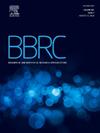Aspirin enhances radio/chemo-therapy sensitivity in C. elegans by inducing germ cell apoptosis and suppresses RAS overactivated tumorigenesis via mtROS-mediated DNA damage and MAPK pathway
IF 2.5
3区 生物学
Q3 BIOCHEMISTRY & MOLECULAR BIOLOGY
Biochemical and biophysical research communications
Pub Date : 2024-10-12
DOI:10.1016/j.bbrc.2024.150828
引用次数: 0
Abstract
Previous studies have demonstrated that combination therapy involving radiotherapy and aspirin decreases the survival rate of cancer cells. However, the mechanism by which aspirin exerts its radiation sensitization effect at the in vivo level remains largely unclear. In this study, we employed Caenorhabditis elegans (C. elegans) as a model organism to investigate the effect of aspirin combined with radio/chemo-therapy on tumors at the individual level. Here, we illustrate that high-dose aspirin increases the expression of genes involved in core apoptosis pathways (egl-1, ced-9, ced-4 and ced-3) and induces germ cell apoptosis in C. elegans through mitochondrial outer membrane permeabilization (MOMP) and elevation of reactive oxygen species (ROS) levels. Crucially, aspirin-induces ROS upregulates the expression of genes critical for DNA damage response (hus-1, clk-2 and cep-1) and genes involved in MAPK pathways (lin-45, mek-2, mpk-1, sek-1 and pmk-1), thereby mediating the enhanced sensitivity of radio/chemo-therapy by aspirin. Notably, aspirin fails to induce germ cell apoptosis and enhance radio/chemo-therapy in C. elegans lacking the expression of each of those genes. Furthermore, in a C. elegans tumor-like symptom model, aspirin enhances radio/chemo-therapy sensitivity through ROS induction. However, low-dose aspirin can diminish the apoptotic signal of reproductive cells in C. elegans and exert anti-inflammatory effects. Our research results suggest that the tumor-suppressive and radio/chemo-therapy sensitizing effects of aspirin provide robust experimental evidence for improving the clinical efficacy of tumor radio/chemo-therapy and deepening our understanding of aspirin's mechanism of action in cancer.
阿司匹林通过诱导生殖细胞凋亡提高优雅子对放射/化疗的敏感性,并通过mtROS介导的DNA损伤和MAPK通路抑制RAS过度激活的肿瘤发生
以往的研究表明,放疗与阿司匹林的联合疗法可降低癌细胞的存活率。然而,阿司匹林在体内发挥放射增敏作用的机制仍不清楚。在本研究中,我们以 elegans(秀丽隐杆线虫)为模式生物,从个体水平研究了阿司匹林与放疗/化疗联合使用对肿瘤的影响。在这里,我们说明了高剂量阿司匹林会增加参与核心凋亡通路(egl-1、ceed-9、ceed-4 和 ced-3)的基因的表达,并通过线粒体外膜通透性(MOMP)和活性氧(ROS)水平的升高诱导秀丽小鼠生殖细胞凋亡。重要的是,阿司匹林诱导的 ROS 会上调 DNA 损伤反应关键基因(hus-1、clk-2 和 cep-1)和 MAPK 通路相关基因(lin-45、mek-2、mpk-1、sek-1 和 pmk-1)的表达,从而介导阿司匹林增强放射/化疗的敏感性。值得注意的是,阿司匹林不能诱导生殖细胞凋亡,也不能增强缺乏上述各基因表达的优雅小鼠对放射/化疗的敏感性。此外,在 elegans 肿瘤样症状模型中,阿司匹林可通过诱导 ROS 增强放射/化疗敏感性。然而,低剂量阿司匹林可以减少秀丽隐杆线虫生殖细胞的凋亡信号,并发挥抗炎作用。我们的研究结果表明,阿司匹林的肿瘤抑制和放射/化疗增敏作用为提高肿瘤放射/化疗的临床疗效提供了有力的实验证据,并加深了我们对阿司匹林在癌症中作用机制的理解。
本文章由计算机程序翻译,如有差异,请以英文原文为准。
求助全文
约1分钟内获得全文
求助全文
来源期刊
CiteScore
6.10
自引率
0.00%
发文量
1400
审稿时长
14 days
期刊介绍:
Biochemical and Biophysical Research Communications is the premier international journal devoted to the very rapid dissemination of timely and significant experimental results in diverse fields of biological research. The development of the "Breakthroughs and Views" section brings the minireview format to the journal, and issues often contain collections of special interest manuscripts. BBRC is published weekly (52 issues/year).Research Areas now include: Biochemistry; biophysics; cell biology; developmental biology; immunology
; molecular biology; neurobiology; plant biology and proteomics

 求助内容:
求助内容: 应助结果提醒方式:
应助结果提醒方式:


